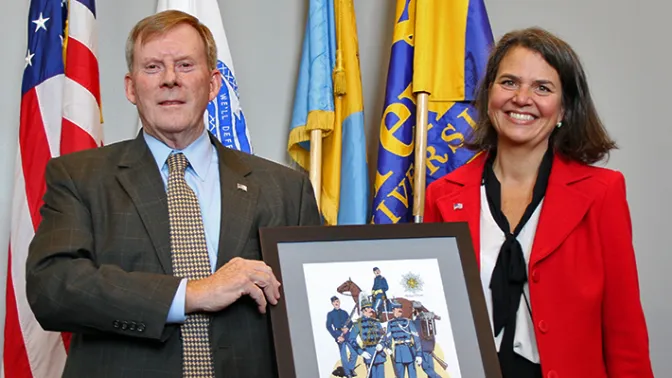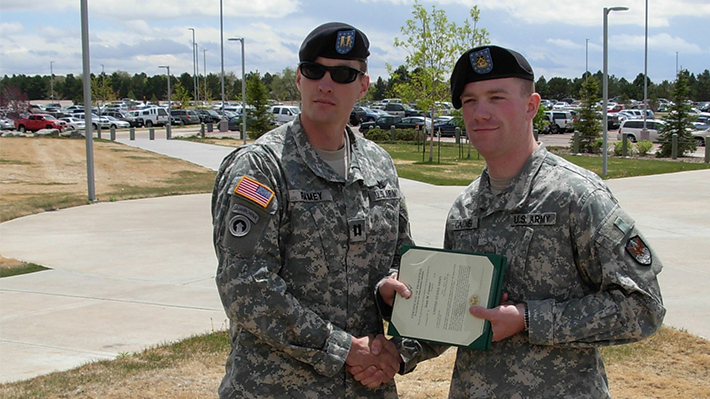
US Military Veterans Thrive As Drexel LeBow Executive DBA Students
In celebration of Veterans Day, we honor the many LeBow students, faculty, staff and alumni who have served our country and who continue to serve as leaders both in the classroom and in their industries.
Since its launch in fall 2017, the Executive Doctorate in Business Administration (DBA) program has attracted leaders seeking to transform industry by applying in-depth research to challenging business problems. Among these more than 80 executive professionals spanning diverse industries, a notable segment are veterans of the US military, attracted by the program’s emphasis on putting knowledge into practice, as well as Drexel’s participation in the Yellow Ribbon Program.
We’ve asked veterans enrolled in our DBA program to share their views on leadership and the impact their military service has had on their lives, careers and current studies.
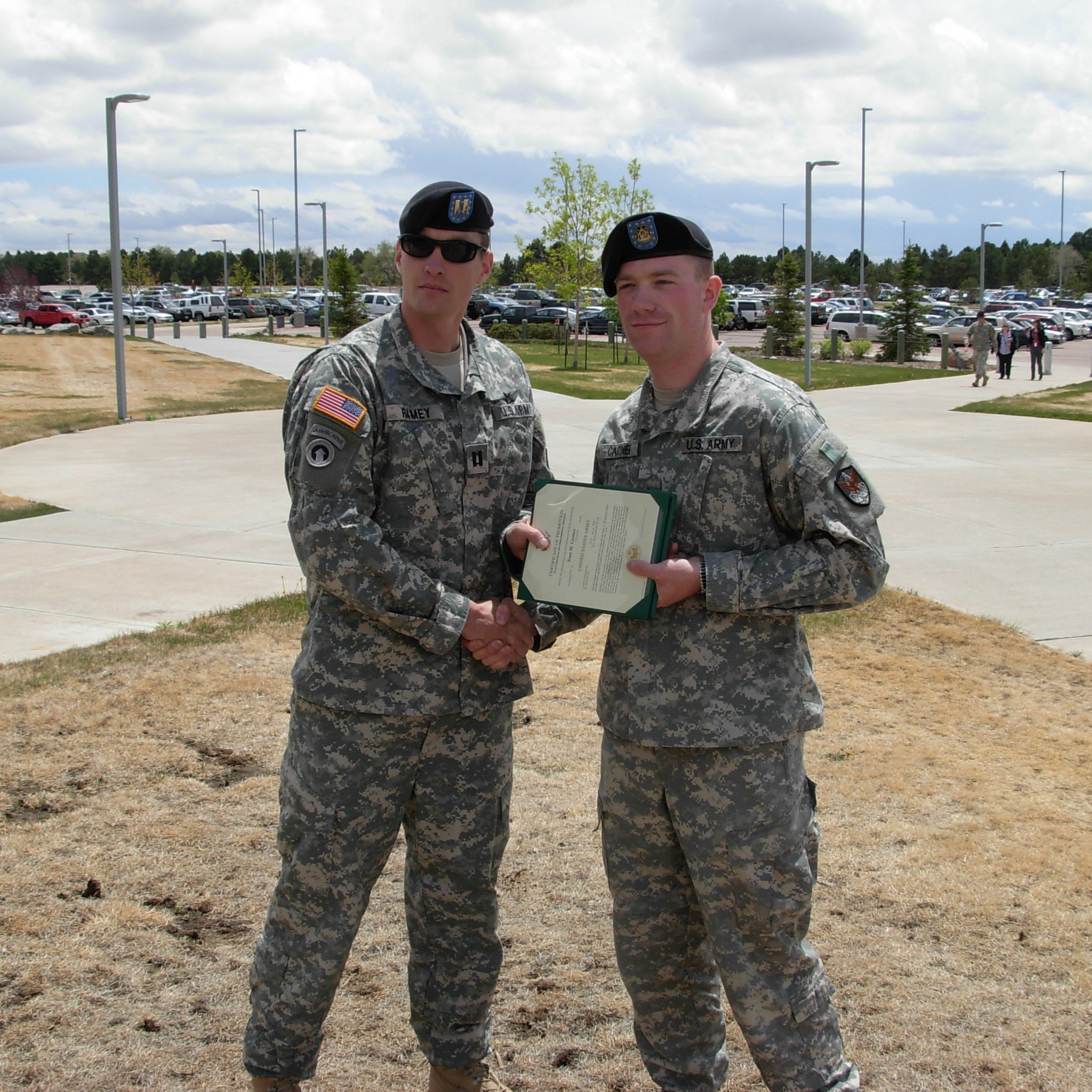
William Ramey DBA Class of 2021
In what branch of the US military did you previously serve? I previously served in the US Army on Active Duty, in the Ohio Army National Guard and the US Army Reserve.
In what role or roles have you served, and where were you stationed? I’ve served as an enlisted Solider (Military Police) in the Ohio Army National Guard and I’ve served as an Officer on Active Duty including one tour to Tikrit, Iraq in 2004. Other duty locations include Fort Irwin, Calif.; Fort Bliss, Texas; and Cheyenne Mountain AFS and Peterson AFB, Colo.
What’s the most important skill you learned during your military service that you’re using today in your studies or in your career? The most important skill I learned that I am using today in my studies and in my career is to embrace continuous learning and put maximum effort into all that you do. There is always more to learn. Take the hard assignments and tasks – you grow the most through those experiences.
What attracted you to the DBA program at LeBow? The program was catered to arming C-suite professionals with the power of research to solve complex problems. I was drawn to the idea of becoming a “scholarly practitioner” and using data to solve complex business problems.
What did your military experience teach you about the importance of leadership, and how have you applied that in your career and in this program? Since I was a young Lieutenant through my career today, I’ve been in formal leadership positions. I learned early on that leadership is a “people business.” Leadership is positively influencing and supporting your team and your peers, putting others’ needs first, and giving your time freely so that we can all be successful together.
Are there particular qualities of the DBA program that you believe resonate with veterans? Because the DBA program is such a challenge, the target audience are those that want to continue to learn and grow and solve complex problems. Growth through overcoming challenges and obstacles is part of what makes the military great. This program takes creative and critical thinking skills, communication and a willingness to put yourself out there. Our veterans gained those skills and abilities through service to our nation, and this program offers the opportunity to refine those skills.
Colleen Chorak DBA Class of 2022
In what branch of the US military did you serve? US Army
In what role or roles have you served, and where were you stationed? I was a Commissioned Officer in the Quartermaster Corps and held the ranks of 2nd Lieutenant, 1st Lieutenant, Captain during active duty and the rank of Major in the Inactive Reserves. I was stationed at Fort Lee, Virginia; Fort Benning, Georgia; Monterey, California; and in Germany and South Korea.
What are the most important skills you learned during your military service that you’re using today in your studies or in your career? People leadership and management.
What attracted you to the DBA program at LeBow? The challenge of achieving a doctorate in honor of my family and myself.
What did your military experience teach you about the importance of leadership, and how have you applied that in your career and in this program? People are the top priority, period. Leadership – either in formally assigned roles or informally practiced as part of everything you do – is essential to accomplishing anything in this world, even simple things.
Are there particular qualities of the DBA program that you believe resonate with veterans? This program is a challenging opportunity to excel, with reasonable flexibility to accommodate our unique lifestyles and needs. The professional administration and faculty really treat us like responsible, experienced adults versus blank-slate students.
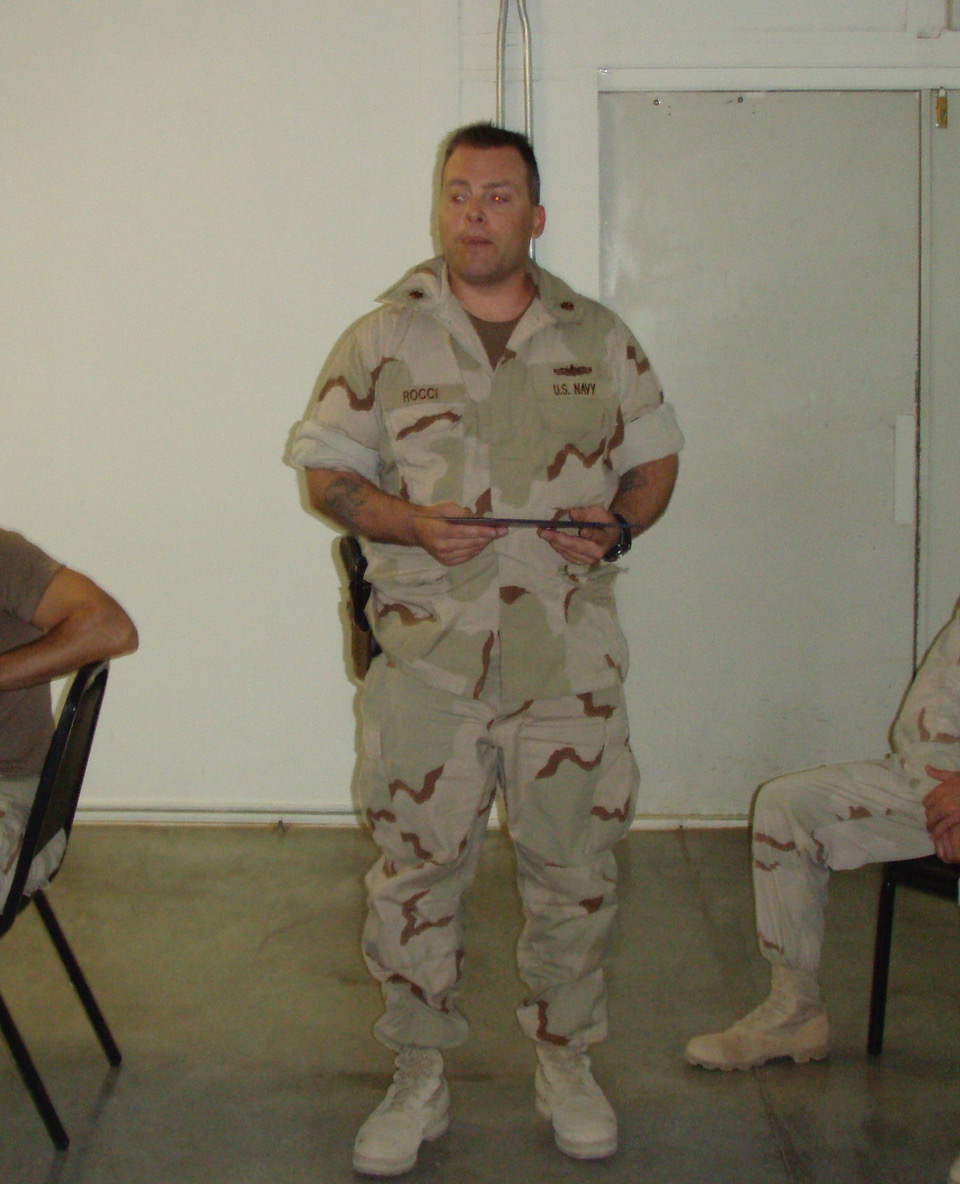
Randy Rocci DBA Class of 2022
In what branch of the US military did you previously serve? US Navy
In what role or roles have you served, and where were you stationed? While enlisted, I served as a Missile Technician aboard USS ALABAMA SSBN 731 Blue. I was also an Instructor for four years at Trident Training Facility in Bangor, Wash. As an officer, I served as the Combat Information Center Officer (CICO) in USS Carr (FFG 51), the Navigation Officer in USS Austin (LPD 4), the Operations Officer in USS Carter Hall (LSD 50) and the N3 (Operations Officer) for Commander, Amphibious Squadron Eight.
What’s the most important skill you learned during your military service that you’re using today in your studies or in your career? First, planning: Juggling family, career and school requires effective planning. Second, perseverance: Life seldom works out as planned, so perseverance is critical to overcoming the challenges that inevitably come.
What attracted you to the DBA program at LeBow? The Association to Advance Collegiate Schools of Business (AACSB) accreditation, which puts the LeBow DBA on par with other elite business schools in the country.
What did your military experience teach you about the importance of leadership, and how have you applied that in your career and in this program? First, mission accomplishment is always the top priority. Second, although in most cases it seems the leader gets the accolades when missions succeed, success wouldn’t have been possible without the full span of contributions by the members of the team. That team-first approach has been particularly beneficial, and in many respects, key to successfully completing the requirements of the DBA to this point.
Are there particular qualities of the DBA program that you believe resonate with veterans? The Yellow Ribbon program, in conjunction with the Veteran’s Administration, which covers tuition and expenses if utilizing the post-9/11 GI-Bill. Additionally, LeBow’s AACSB accreditation and location in Philadelphia, which is convenient to Northeast and Mid-Atlantic cities and makes travelling to residencies significantly easier.
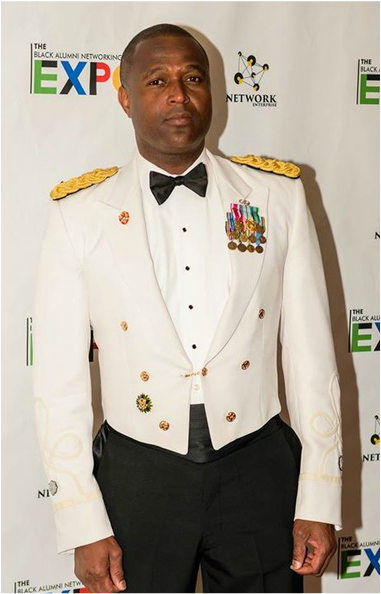
Warren Christopher DBA Class of 2023
In what branch of the US military did you serve? US Army
In what role or roles have you served, and where were you stationed? I was a Senior Military Officer, serving as Commander, Speechwriter, Senate Staffer, Executive Officer, HR Manager, Senior Policy Advisor, COO, Flag Officer Aide-de-camp.
What are the most important skills you learned during your military service that you’re using today in your studies or in your career? Teamwork and servant-leadership. Teamwork is essential to almost every operation that delivers results, and humility, integrity and trust are the cornerstones. Teamwork, in my experience, is about communication, cooperation and collaboration; about valuing and giving voice to diverse ideas and perspectives; and about sharing power. Servant-leadership, for me, is about selfless service: leading from the front and modeling service through conduct and performance. I put the needs of my troops first while embracing the responsibility of leadership and applying empathy and humility. I was an enlisted soldier for four years prior to being commissioned, and I never embraced or practiced the idea that “rank has its privileges.” I maintained and demonstrated dignity and respect for all, regardless of rank/position or perceived status.
What attracted you to the DBA program at LeBow? The program’s reputation, the pedigree of the faculty and staff, the hybrid delivery method and the overall timeline.
What did your military experience teach you about the importance of leadership, and how have you applied that in your career and in this program? Leadership is not a title, but rather, an affair of the heart. Treat everyone with dignity and respect and model conduct and behavior for others to emulate. I’ve applied leadership and leading others as a very sacred responsibility to deliver positive change.
Are there particular qualities of the DBA program that you believe resonate with veterans? Yes – teamwork and delivering strategic impact to improve the lives of others through enhanced processes and systems.
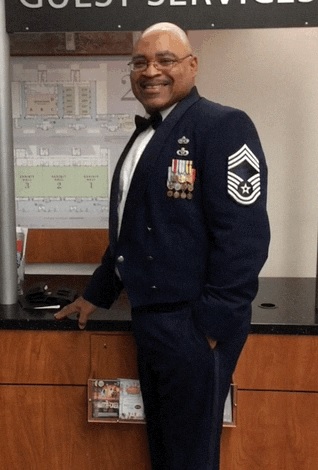
Jerome DuBose DBA Class of 2023
In what branch of the US military did you previously serve? US Air Force
In what role or roles have, you served and were you stationed? I’ve had the honor to hold each enlisted rank during my military service, retiring as a Chief Master Sergeant. My background includes aircraft maintenance and Emergency Management responsibilities at Wing, Numbered Air Force, Major Command and Combatant Command levels. My stateside duty assignments include bases in South Dakota, Florida, Missouri, Texas and Louisiana. I also served overseas in England, Korea and Turkey and deployed in support of various military operational campaigns.
What are the most important skills you learned during your military service that you are using today in your studies or in your career? In my opinion, the most essential skills that I learned during my military service were leadership and public speaking.
What attracted you to the DBA program at LeBow? The LeBow program appeared challenging and rigorous. I also appreciated a cohort format’s social aspects and a blended educational delivery system within an estimated 2.5-year completion time.
What did your military experience teach you about the importance of leadership, and how have you applied that in your career and in this program? My military service taught me to appreciate and embody certain skills to be successful in my daily activities, and I attribute my success as a professional to them:
- Invest in relationships, trust in people and always have a process.
- Do not assemble groups that always agree with you.
- Always be willing to listen to all sides of an issue.
- Look sharp in your clothing.
- Always take care of people.
- Stay calm under pressure.
- Always act decisively.
Are there particular qualities of the DBA program that you believe resonate with veterans? Continual growth is necessary for business success, and a DBA degree is an excellent way to fuel that growth. Professionals and executives with advanced tools and research skills needed for strategic planning and decision making make better-informed decisions. I also believe that the DBA program offers an excellent opportunity to bridge the gap from operational leadership to strategic leadership concepts while also establishing peer networks across different organizations and functions.
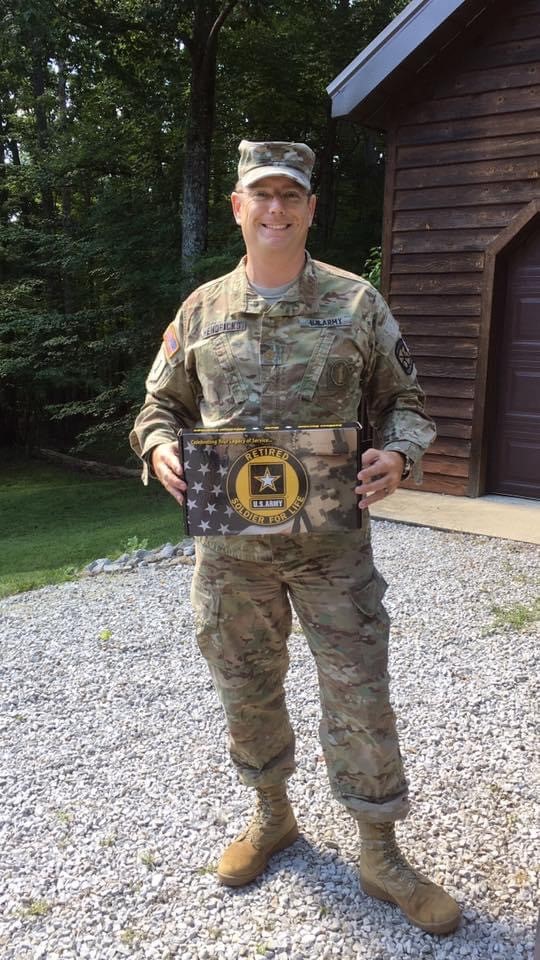
Jeff Hendricks DBA Class of 2023
In what branch of the US military did you serve, and for how many years? I spent just a few weeks shy of 25 years in the US Army.
In what role did you serve, and where were you stationed? I served across the US, Europe, the Middle East and central Asia. Throughout my career I worked in positions of increasing responsibility from an entry level to Section Sergeant, Recruiter, Transportation Platoon Leader, Warehouse Manager, Director of Logistics at the battalion and brigade levels as well as commanding twice. I went on three combat deployments: once to Iraq and twice to Afghanistan.
What are the most important skills you learned during your military service that you’re using today in your studies or in your career? Some of the most important things that I learned include leadership, being an expert in my given field, deliberate planning, professionalism in all that you do and being prepared for any eventuality.
What did your military experience teach you about the importance of leadership, and how have you applied that in your career and in this program? Leadership training started day one of basic training as we learned about followership. Early in my career, I learned personal management through both professional development as well as trial and error. Later I learned, using the same methodology, small group leadership. It was during my first deployment to Afghanistan that I was able to see strategic planning and leadership put into practice as I worked at ISAF headquarters. There I saw how senior leaders shaped their organizations to their personality, a phenomenon that I did not believe was possible for such large organizations until that point. Though I had been in the Army for many years at that point, it was then that I realized that leadership, not management, was key to success.
What attracted you to the DBA program at LeBow? I had the opportunity to teach at the university level near the end of my Army career, and on more than one occasion with academics from multiple universities, I was told that studying leadership was a dead-end – something only soldiers and historians focused on. I found this to be a very narrow mindset and sought to study this area more thoroughly to determine the efficacy of these claims. I knew that a doctorate would be more appropriate for this sort of research. I started in another university’s DBA program, and after I retired from the Army in 2017, I paused my studies to move my family to our home on the other side of the country. When I tried to restart, the university was no longer offering the program. Later, I decided to try again and found that Drexel University’s DBA program was thriving, and I restart my search for answers to the question of leadership over management.
Are there particular qualities of the DBA program that you believe resonate with veterans? The cohort here is a very tight-knit group where we support each other as we make our way through the coursework and our lives.
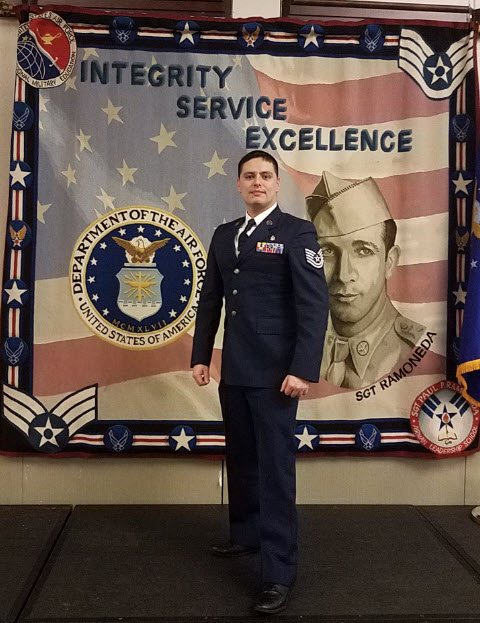
Jaime Nieto Sierra DBA Class of 2023
In what branch of the US military did you previously serve? US Air Force
In what role or roles have you served, and where were you stationed? Technical Sergeant in charge of research and laboratory operations for histology services at Offutt AFB (Omaha, Neb.), Lackland AFB (San Antonio, Texas), Dover AFB (Dover, Del.) and Travis AFB (Fairfield, Calif.).
What is the most important skill you learned during your military service that you’re using today in your studies or in your career? I learned how to be a servant leader that takes care of the people.
What attracted you to the DBA program at LeBow? It is a flexible program that allows for a combination of both distant learning and in-person classes, and provides a structure that allows for a better work, life and school balance.
What did your military experience teach you about the importance of leadership, and how have you applied that in your career and in this program? The military and the mentors I had while on active duty provided me with principles and practices that serve as the foundation of my journey. As I have continued to grow and develop through many roles in my career, I have found that focusing on motivating, growing and developing those around me is one of the most rewarding parts of being a leader.
From your perspective, are there particular qualities of the DBA program that you believe resonate with veterans? Throughout my career in the military, I have always focused on professional development. Having the right attitude to pursue personal and professional development can equip a person with the skills necessary to capitalize on opportunities as they come along. The DBA program allows me to continue to hone my skills and improve my aptitude so that I may continue to expand my sphere of influence and gain a voice that can be used to better improve the lives of those in my community.


